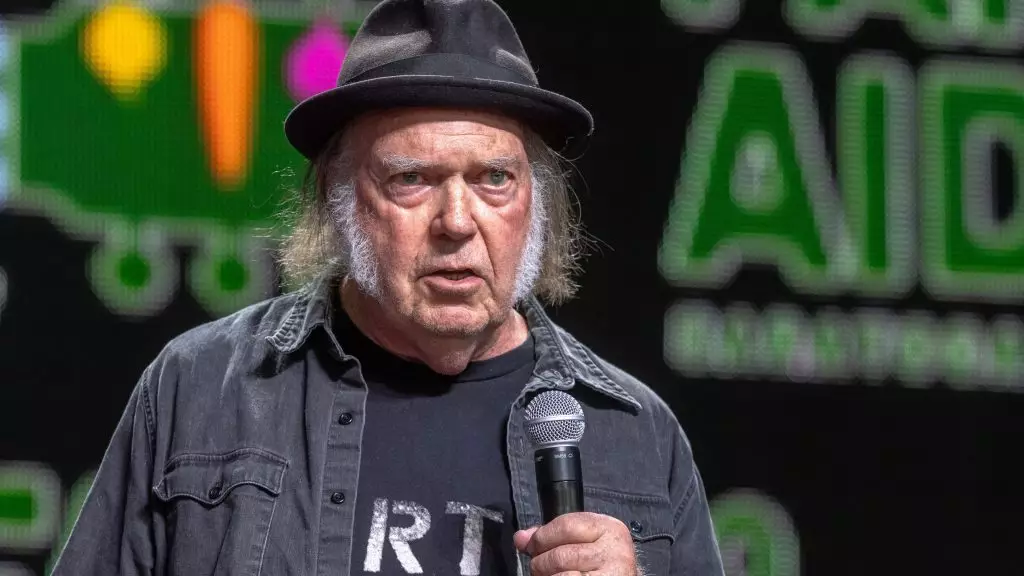In an unexpected turn of events, Neil Young has once again proven that his commitment to artistic integrity is paramount, while simultaneously navigating the complexities of corporate influence in the music industry. Initially announcing his decision not to perform at the iconic Glastonbury Festival, the musician felt compelled to retract his statement just hours later. This back-and-forth raises critical questions about the influence of corporate partnerships on music festivals, the relationship between artists and promoters, and how far one is willing to go to uphold artistic values.
Young’s initial withdrawal stemmed from concerns about the festival’s perceived corporate ownership, particularly through its relationship with the BBC, which he criticized for exerting control over the festival’s programming. Despite these reservations, a sudden change of heart revealed that faulty information had led him to believe he would be compromised as an artist. This inconsistency illustrates how easily misunderstandings can cloud significant decisions in the fast-paced environment of the music industry.
Corporate Control Versus Artistic Freedom
The crux of Young’s argument revolves around a clash of ideologies—artistic freedom versus corporate control. In a letter addressing his fanbase, he voiced concerns that Glastonbury had shifted from its original spirit, becoming enmeshed in corporate interests facilitated by its longstanding partnership with the BBC. Young expressed nostalgia for the festival’s past, suggesting that the event has increasingly succumbed to commercial pressures that undermine the authenticity that artists like him once cherished.
This sentiment is not an isolated anomaly; it echoes a broader trend in the industry where multinational corporations increasingly dictate terms, often at the expense of artistic expression. Festivals that were once bastions of indie culture, free-spirited performances, and authentic connections between artists and fans are now navigating the treacherous waters of corporate sponsorships and media partnerships. Understandably, such dynamics have drawn ire from artists like Young, who strive to maintain creative independence.
It’s crucial to underscore the importance of Glastonbury as an institution in the music world. Founded in 1970, it has metamorphosed from a small gathering to a mecca for music enthusiasts. Its role in shaping cultural discourse and trends in the music industry cannot be overstated. Yet with this success comes increased scrutiny over the integrity of the festival’s ethos. GDPR-aligned partnerships and resoundingly improved media coverage have led to accusations of ‘selling out’ from artists who once enjoyed the festival’s intimate, organic atmosphere.
Despite this, Glastonbury management’s steady embrace of corporate partnerships must also be seen in a practical light. The influx of funding through these partnerships allows for better production, more diverse acts, and improved infrastructure. However, this relief can quickly turn into a burden if it strips away the core values that attracted artists and fans in the first place—an issue that Young has so eloquently articulated.
Emily Eavis, co-organizer of Glastonbury, responded to Young’s initial comments with enthusiasm when he ultimately agreed to perform, dubbing him an artist “close to our hearts.” This perspective highlights a different facet of the conversation—while some artists view corporate involvement skeptically, others find ways to coalesce their art within these structures without sacrificing their principles. In doing so, artists navigate the precarious landscape, hopefully leveraging these partnerships to their benefit.
Moreover, Young’s tumultuous relationship with streaming platforms further puts into perspective an artist’s delicate dance in maintaining relevance amid corporate frameworks. His past decision to withdraw his music from Spotify over Joe Rogan’s podcast—that ultimately did not align with his values—illustrates his willingness to put principles ahead of profit. The question remains whether this commitment can be upheld in a landscape littered with commercial challenges.
As we await Young’s anticipated performance at Glastonbury, one thing is clear: the intersection of artistry and commerce will continue to evolve. Artists, fans, and promoters must embrace an open dialogue about maintaining artistic authenticity while effectively navigating the complexities of the modern music industry. While Neil Young’s disagreement may be resolved, the fundamental questions about the direction of festivals, the influence of media partnerships, and the boundaries of corporate control remain pertinent.
Ultimately, Young’s story encapsulates a crucial reminder of the need for artists to remain vigilant and proactive in defending their artistic integrity. As the music world continues to change, preserving these values amid sprawling commercial influences will define the next generation of artists and their relationships with festivals like Glastonbury that hold the power to write music history.

